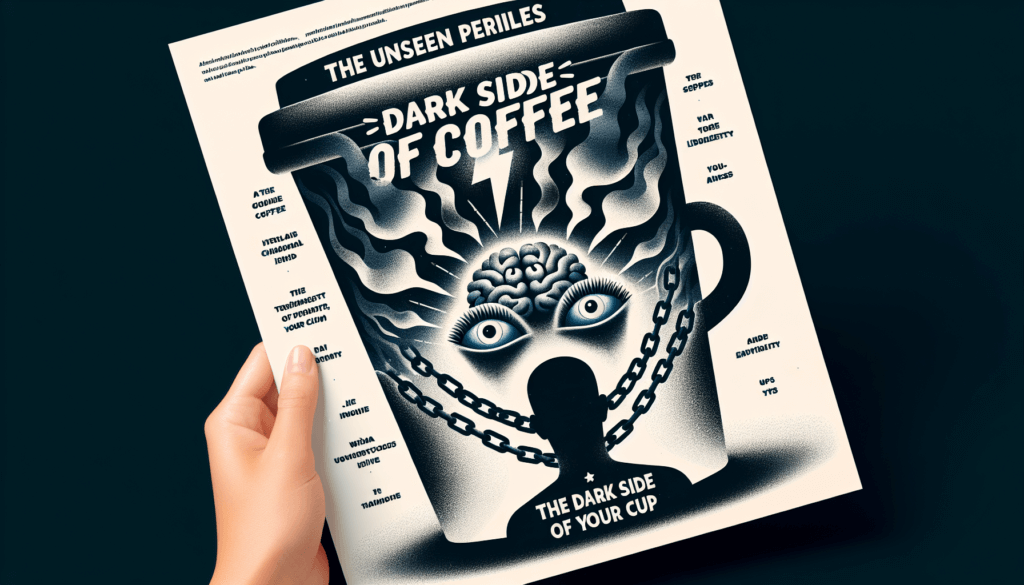Do you often find yourself reaching for a cup of coffee to kickstart your day? While coffee can indeed provide that much-needed energy boost, it’s important to be aware of the potential drawbacks associated with this beloved beverage. From its ability to disrupt your sleep patterns to its potential impact on your digestion, there are a number of disadvantages to consider. In this article, we will explore some of the downsides of drinking coffee and how they may affect your overall well-being. So, before you reach for your next cup of joe, let’s take a closer look at the potential disadvantages of indulging in this popular beverage.
Acidic Nature
Leads to digestive problems
Drinking coffee on a regular basis can have negative effects on your digestive system. One of the main concerns is its acidic nature. Coffee contains various acids, such as chlorogenic acid, which can irritate the lining of your stomach and intestines. This irritation can lead to digestive problems such as acid reflux, heartburn, and stomach ulcers. If you already suffer from digestive issues, drinking coffee may exacerbate the symptoms and make you more prone to discomfort.
Increases the risk of acid reflux
Acid reflux is a condition where stomach acid flows back into the esophagus, causing a burning sensation in the chest, commonly known as heartburn. The high level of acidity in coffee can trigger or worsen acid reflux symptoms, making it particularly problematic for individuals who already suffer from this condition. The acids in coffee can relax the muscles that keep the esophagus closed, allowing acid to flow back up and causing discomfort. If you frequently experience acid reflux, it may be best to limit or avoid coffee consumption.
Dehydration
Diuretic effect
One of the disadvantages of drinking coffee is its diuretic effect. Coffee acts as a mild diuretic, which means it can increase urination and potentially lead to dehydration. When you consume coffee, it stimulates the kidneys to produce more urine, resulting in fluid loss from the body. This can be particularly problematic if you’re not compensating for the fluid loss by drinking enough water. Dehydration can cause symptoms such as fatigue, dizziness, and dry mouth, and it can have a negative impact on your overall health and well-being.
Loss of essential minerals
In addition to its diuretic effect, coffee consumption can also lead to the loss of essential minerals from the body. Excessive urination caused by coffee consumption can result in the excretion of minerals such as calcium, magnesium, and potassium. These minerals are crucial for various bodily functions, including muscle contraction, nerve transmission, and maintaining bone health. When these minerals are depleted, it can lead to imbalances and deficiencies, which may contribute to muscle cramps, weakened bones, and other health issues. It’s important to be mindful of your mineral intake and consider supplementing if necessary.

Sleep Disruption
Interferes with sleep patterns
If you’re someone who enjoys a cup of coffee in the evening or before bed, it’s important to be aware of how it can disrupt your sleep patterns. Coffee contains caffeine, a stimulant that blocks the effects of adenosine, a neurotransmitter that promotes sleep. Consuming coffee, especially in the late afternoon or evening, can make it difficult for you to fall asleep and may even cause insomnia. Caffeine can delay the onset of sleep, reduce the amount of deep sleep you get, and increase the number of times you wake up during the night. To promote a good night’s sleep, it’s advisable to limit your coffee intake, especially in the hours leading up to bedtime.
Increases the risk of insomnia
Insomnia is a sleep disorder characterized by difficulty falling asleep, staying asleep, or both. For individuals who are already prone to insomnia, consuming coffee can exacerbate the symptoms and make it even harder to get a restful night’s sleep. The stimulating effects of caffeine can contribute to persistent sleep difficulties, leading to chronic insomnia. If you’re struggling with insomnia, it’s worth considering reducing or eliminating coffee consumption to see if it helps improve your sleep quality.
Addiction and Withdrawal Symptoms
Caffeine addiction
Coffee contains caffeine, a natural stimulant that can have addictive properties. Regular consumption of caffeine can lead to a physical and psychological dependence on the substance, resulting in caffeine addiction. When you become addicted to caffeine, you may experience withdrawal symptoms when you try to cut back or quit drinking coffee. These withdrawal symptoms can include headaches, fatigue, irritability, difficulty concentrating, and mood swings. It’s important to be mindful of your caffeine intake and consider gradually reducing it if you’re looking to reduce dependence or eliminate coffee from your routine.
Headaches and irritability during withdrawal
Withdrawal from caffeine can come with its own set of uncomfortable symptoms. When you abruptly stop or significantly reduce your caffeine intake, it can lead to withdrawal headaches. These headaches are often described as throbbing and can be accompanied by irritability, fatigue, and difficulty concentrating. These symptoms typically peak within one to two days after caffeine cessation and can last for up to a week. Gradually reducing your caffeine consumption may help minimize and manage these withdrawal symptoms.

Increased Heart Rate and Blood Pressure
Stimulates the cardiovascular system
Caffeine, the main active compound in coffee, has stimulatory effects on the body, including the cardiovascular system. After consuming coffee, caffeine enters the bloodstream and triggers the release of adrenaline, a hormone that can increase heart rate and blood pressure. While this effect is often temporary and considered relatively safe for healthy individuals, excessive or prolonged caffeine intake can lead to sustained increases in heart rate and blood pressure. These elevations can contribute to the development of heart problems and may be particularly concerning for individuals with existing cardiovascular conditions.
May lead to heart problems
The combination of increased heart rate and blood pressure, along with the potential vasoconstrictive effects of caffeine, can have negative implications for your cardiovascular health. Prolonged elevated heart rate and blood pressure levels can strain the heart and blood vessels, increasing the risk of developing heart problems such as chronic hypertension, arrhythmias, and even heart attacks. It’s important to be mindful of your caffeine intake, especially if you have a history of cardiovascular issues, and consider discussing it with your healthcare provider.
Staining of Teeth
Coffee is known to stain teeth
Coffee is notorious for causing staining on teeth. Its dark pigments, known as tannins, can adhere to the enamel of your teeth, leading to yellowing or darkening of your smile. While tooth staining may not pose a significant health risk, it can be a cosmetic concern for many individuals. Regular consumption of coffee can gradually accumulate stains on your teeth, making them appear less bright and vibrant. While brushing and regular dental cleanings can help manage the staining to some extent, it may require additional dental care, such as teeth whitening treatments, to restore a brighter smile.
Requires additional dental care
To mitigate the staining effects of coffee, it’s important to prioritize good oral hygiene habits. Regular brushing and flossing can help remove surface stains and prevent plaque buildup, which can further contribute to tooth discoloration. Additionally, scheduling regular dental cleanings can help remove stubborn stains and keep your teeth healthy and clean. If you’re a coffee lover, discussing teeth whitening options with your dentist may be worth considering to maintain a brighter, more confident smile.

Negative Impact on Mood
Can increase anxiety and restlessness
While some people may find a cup of coffee in the morning to be an energizing boost, others may experience increased anxiety and restlessness from the effects of caffeine. Coffee stimulates the central nervous system, leading to an increase in the release of neurotransmitters like dopamine and norepinephrine. While these neurotransmitters can temporarily elevate mood and improve focus, they can also contribute to feelings of anxiety, restlessness, and even jitteriness. If you’re already prone to anxiety or have a sensitivity to caffeine, it’s important to consider how coffee affects your mood and make adjustments to your consumption if needed.
May worsen symptoms of depression
In addition to its potential to increase anxiety, coffee consumption has been linked to worsening symptoms of depression in some individuals. While caffeine can initially provide a temporary mood boost, it can also disrupt neurotransmitter balance and interfere with the production and utilization of certain mood-regulating chemicals in the brain. This can result in depressive symptoms such as low mood, lack of motivation, and feelings of sadness. If you have a history of depression or experience symptoms of low mood after consuming coffee, it’s important to be mindful of the impact it may have on your mental well-being.
Interferes with Nutrient Absorption
Impairs absorption of certain minerals
Coffee contains compounds called polyphenols, which can bind to minerals such as iron and calcium, inhibiting their absorption in the body. These polyphenols can form insoluble complexes with minerals and hinder their bioavailability, meaning that even if you consume foods rich in these minerals, your body may not be able to absorb and utilize them effectively. Prolonged impairment of mineral absorption due to frequent coffee consumption can potentially lead to deficiencies and negatively impact various bodily functions that rely on these minerals.
Can lead to deficiencies
Mineral deficiencies can have wide-ranging health implications. For example, iron deficiency can lead to anemia, resulting in fatigue, weakness, and poor immune function. Calcium deficiency can contribute to weakened bones and an increased risk of osteoporosis. It’s important to ensure a diverse and balanced diet that includes sources of these essential minerals. If you’re a coffee drinker, it may be advisable to consume coffee separately from meals to minimize the interference with nutrient absorption and consider other sources of dietary minerals to meet your body’s needs.

Increases the Risk of Osteoporosis
May decrease bone density
Osteoporosis is a condition characterized by decreased bone density and increased risk of fractures. Unfortunately, excessive coffee consumption has been associated with a higher risk of developing osteoporosis. The high caffeine content in coffee can interfere with calcium absorption and increase the excretion of calcium in the urine. Over time, this can lead to a negative calcium balance in the body, impairing bone health and potentially contributing to the development of osteoporosis. If you have concerns about your bone health or have a family history of osteoporosis, it may be wise to moderate your coffee intake and ensure adequate calcium intake.
Can contribute to the development of osteoporosis
Aside from its direct effects on calcium absorption and excretion, coffee consumption is often associated with other lifestyle factors that can further contribute to the development of osteoporosis. For example, excessive coffee intake is often accompanied by a lower intake of milk and dairy products, which are excellent sources of calcium and other bone-building nutrients. Additionally, caffeine can interfere with vitamin D metabolism, a crucial nutrient for bone health. Combined with sedentary lifestyles or inadequate weight-bearing exercise, excessive coffee consumption can increase the risk of developing osteoporosis. It’s important to prioritize a well-balanced diet, including sources of calcium, and engage in regular weight-bearing exercises to support optimal bone health.
Negative Effects during Pregnancy
Higher risk of miscarriage
Pregnancy is a time when women need to be particularly cautious about their caffeine consumption. High levels of caffeine intake have been associated with an increased risk of miscarriage. Caffeine can cross the placenta and affect the developing fetus, potentially leading to adverse pregnancy outcomes. While the exact safe limit of caffeine intake during pregnancy is still a subject of debate among experts, it is generally recommended that pregnant women limit their caffeine intake to no more than 200-300 milligrams per day. It’s advisable for pregnant women to consult with their healthcare provider to determine a safe and appropriate caffeine intake that minimizes potential risks.
Potential harm to the fetus
In addition to the increased risk of miscarriage, excessive caffeine consumption during pregnancy has been associated with potential harm to the developing fetus. High levels of caffeine intake have been linked to low birth weight, preterm birth, and developmental delays. Caffeine can interfere with fetal growth and affect the cardiovascular and central nervous systems, potentially leading to long-term health implications for the child. It’s crucial for expectant mothers to be mindful of their caffeine intake and follow the guidance of their healthcare provider to ensure the health and well-being of both themselves and their unborn child.
In summary, while coffee can be a beloved beverage enjoyed by many, it’s important to be aware of the potential disadvantages associated with its consumption. From acidity-related digestive problems to interference with sleep patterns, addiction and withdrawal symptoms, increased heart rate and blood pressure, tooth staining, negative impact on mood, interference with nutrient absorption, increased risk of osteoporosis, and potential harm during pregnancy, there are various factors to consider when deciding on your coffee consumption habits. It’s ultimately a personal decision, and being informed about the potential consequences can help you make choices that align with your health and well-being goals. As always, it’s advisable to consult with your healthcare provider if you have specific concerns or questions about coffee consumption and its potential impact on your individual health circumstances.



